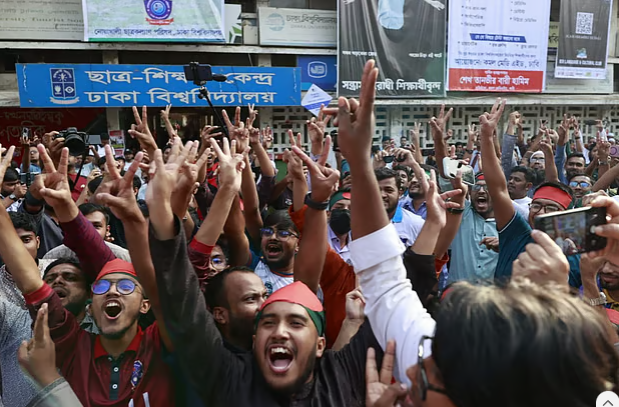
After 397 days, a ruling has been issued in Sheikh Hasina’s case

The first case against ousted Prime Minister Sheikh Hasina in the International Crimes Tribunal, linked to crimes against humanity during the July Mass Uprising, was filed on 17 October last year. Following the filing and subsequent framing of charges, the trial process began. From the start of the case to the final verdict, a total of 397 days elapsed.
On Monday, the International Crimes Tribunal–1 sentenced Sheikh Hasina to death. Among the other two accused, former Home Minister Asaduzzaman Khan Kamal also received the death penalty, while former Inspector General of Police Chowdhury Abdullah Al-Mamun was sentenced to five years in prison.
Sheikh Hasina and Asaduzzaman Khan were not present in court, as they are currently in India. Their political party, the Awami League, remains banned from political activities.
Following the fall of Sheikh Hasina’s government on 5 August last year, the interim government reconstituted the International Crimes Tribunal to handle cases related to crimes against humanity during the July uprising. The first trial under the reorganized tribunal began on 17 October, with the filing of the initial case against Sheikh Hasina. An arrest warrant was issued for her the same day.
Initially, Sheikh Hasina was the only accused. On 16 March this year, former IGP Chowdhury Abdullah Al-Mamun was added as a co-accused.
After multiple extensions, the tribunal’s investigation agency submitted its report to the Chief Prosecutor on 12 May. For the first time, the name of former Home Minister Asaduzzaman Khan appeared in this report, officially making him the second accused alongside Sheikh Hasina and Al-Mamun.
Formal charges were filed by the prosecution against all three on 1 June, marking the official start of the trial. On 10 July, the tribunal formally framed the charges, and on the same day, Al-Mamun applied to testify as an approver (state witness).
The trial officially began with opening statements by Chief Prosecutor Mohammad Tajul Islam on 3 August.
In total, five allegations were made against Sheikh Hasina and the other two accused:
-
Delivering inciting remarks,
-
Ordering the use of lethal weapons against protesters,
-
Shooting and killing Abu Saeed, a student at Begum Rokeya University in Rangpur,
-
Shooting six demonstrators in Dhaka’s Chankharpul area, and
-
Burning six people to death in Ashulia.
The first witness, Khokon Chandra Barman, who was seriously injured during the July uprising, gave testimony that marked the formal start of the trial against all three accused.
In total, 54 witnesses, including Nahid Islam, coordinator of the National Citizens Party (NCP), testified. Witness testimonies concluded on 8 October, after which arguments were heard from 12 October to 23 October.
On 13 November, the tribunal announced that the verdict would be delivered on 17 November, making the total duration from case filing to verdict 397 days.
Sheikh Hasina was represented in absentia by state-appointed lawyer Md. Amir Hossain. The tribunal’s prosecutor, Gazi Monowar Hussain Tamim, had previously stated that neither Sheikh Hasina nor Asaduzzaman Khan could file an appeal while being fugitives; they would have to surrender to the court to pursue an appeal.
Publisher: Mustakim Nibir
Copyright © 2025 The Times OF Dhaka. All rights reserved.